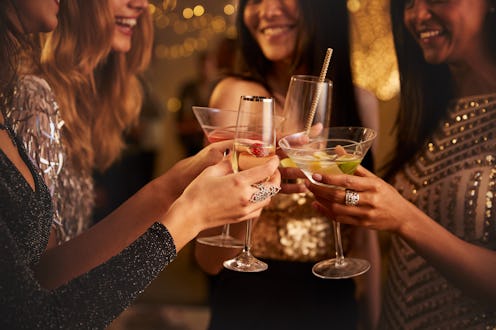Life
A New Study Calculated How Much Americans Are Binge Drinking & The Results Are Alarming
While studies have shown that having one or two drinks a day can be beneficial to your brain, binge drinking has the opposite effect. And, Americans are binge drinking in an alarming way, according to a new study published in the American Journal of Preventive Medicine that noted that Americans consumed a total of 17.5 billion binge drinks in 2015. Binge drinking is defined as having four or more drinks in one sitting for women and having five or more drinks in one sitting for men, which accounts for more than 44,000 deaths in the U.S. a year, according to the study. It's no secret that a lot of people experiment with drinking in college and in their 20s, and during this time having more than four drinks is not uncommon.
However, for some people, this pattern can evolve from experimental to normal to dependence. What's more, long-term binge drinking can have significant health consequences. "Binge drinking typically results in acute impairment, and is a risk factor for a number of health and social problems, including unintentional injuries, interpersonal violence, suicide, alcohol poisoning, high blood pressure, heart disease and stroke, cancer, liver disease, and severe alcohol use disorder," the study noted.
The study also reported that this is the first research of its kind to assess total binge drinks consumed by U.S. adults, using a new measure to assess disparities in binge drinking, which yielded some surprising results. "Although binge drinking was most common among young adults aged 18–34 years, most of the total binge drinks were consumed by those aged [under] 25 years, and over half were consumed by adults aged [over] 35 years, underscoring that binge drinking is a problem across the lifespan."
The study also measured how binge drinking behaviors changed across different demographics in order to address disparities in prevention, and found that binge drinking happens across all socioeconomic groups. "Binge drinking was also significantly more common among people with higher educational attainment and household incomes," the study revealed. "However, the total annual number of binge drinks per binge drinker was substantially higher among those with lower educational levels and household incomes than among those with higher educational levels and household incomes."
If you're worried about your binge drinking, or you think you may be alcohol dependent, there is help available, including a new app called Hayver that provides real-time, digitized visibility to support and monitor recovery success. The website The Right Step reported that a study that used text messages to communicate and support people did indeed reduce binge drinking. "The participants who were exposed to the full text-message intervention reported an average of one less binge-drinking day per month and there was a 12 [percent] reduction in binge drinking incidence." The control groups in the study that were not exposed to text support did not show a reduction in their binge drinking.
Sometimes people binge drink to fit in and help combat social anxiety. "Sometimes I was too afraid to leave the house, and the simple act of driving seemed insurmountable. I feared being looked at or judged, and couldn't seem to get my legs to walk me through the door," Jessi Stafford wrote for Tonic in a story about her decision to stop binge drinking. "At the same time, I wanted to be liked, included, and the same as everyone else, a hard thing to recognize and an even harder thing to admit."
"Alcohol is a great anxiety reducer, but it doesn't last too long," John Walker, clinical psychologist at the University of Manitoba in Canada told Stafford. "A lot of young people who are quite socially anxious figure out that if they have a drink or two, it makes them feel less anxious, more confident, more sociable." However, when the alcohol wears off, the anxiety is still there, and sometimes it's worse. Addressing the underlying reason why you're binge drinking can help you stop.
Recovery.org noted that one thing that can help you stop binge drinking is changing your environment. Additionally, you can also reward yourself every time you choose another activity over binge drinking. Another way to curb binge drinking is to avoid things like drinking games and doing shots, which have no other purpose other than to get you really drunk, really quickly.
The website The Life Square also suggested that you don't drink on an empty stomach as this increases the chances of inebriation. Additionally, don't just sit somewhere and drink. Drinking can be part of the activity, but if you want to avoid binge drinking it shouldn't be the activity. It's also important to know how certain drinks affect you so you can choose something you're comfortable with. For example, most people will get drunk faster from liquor versus something with a lower alcohol content like beer or wine.
If you're tried everything and you're still struggling, you can call the Substance Abuse and Mental Health Service Administration's 24-hour helpline, which can help refer you to treatment options. Remember, it's OK to decline a drink or a shot. Just because someone puts a drink in your hand doesn't mean you are under any obligation to drink it.
